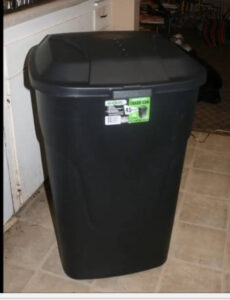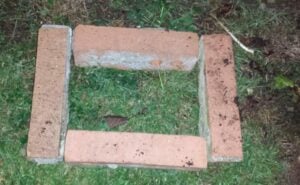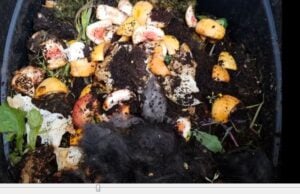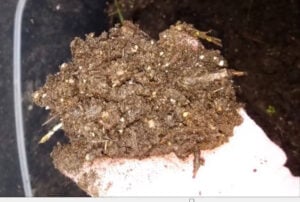Collecting and composting your kitchen waste from home is a wise idea and can help reduce or eliminate environmental contamination.
Composting kitchen scraps is one of the inexpensive and easiest waste management strategies that can reduce the amount of food waste that is produced from our various homes.
Follow along with this handy for details on how to make compost from kitchen waste.
Kitchen Waste Composting Tips
Firstly, there are some important key points you need to know before you start composting scraps from your kitchen. Knowing these composting tips can save you from wasting time and energy.
And these key points include:
Kitchen waste or scraps are of two types: dry waste and wet waste. The dry waste includes paper wrap that is used for wrapping meat, eggshells, and chopped cupboard. While wet waste includes fruits and vegetables such as cabbage, tomatoes, and fruit peels.
When you are gathering kitchen scraps for composting, do not collect and put both the dry and wet organic waste in the same container. Always collect them in a separate container before adding them to the composer.
The dry waste contains a high amount of carbon and is called brown matter. While the wet waste is rich in nitrogen and is called green matter.
The wet waste or green organic matter adds nitrogen to the compost while the dry waste or carbon organic matter adds carbon to the compost.
Your compost is needed to contain about 2/3 of the brown organic matter. However, you can also compost conveniently the brown and green organic matter in the ratio of 1:1 and you can get good compost.
Related: How To Make A Compost Step By Step (With Pictures)
What Kitchen Scraps can I compost?
If you are asking yourself this kind of question, then you are right. This is because not all kitchen waste can be composted.
Some kitchen scraps can make the compost to release an unpleasant odor when added. And some food waste can slow down the composting process when it is added.
Here is some friendly composting kitchen waste you can add to your compost:
- Organic wrapping papers used for wrapping meat and fish
- Vegetables
- Fruit peels
- Coffee grounds
- Sawdust
- Shredded newspapers
- Chopped cupboard
What is not good for Compost?
It is not everything that can be added to the compost. some kitchen scraps can support plant growth when added and composted while other kitchen waste can only harm the plants when composted or slow down the composting process when added.
While composting, you need to avoid the following kitchen waste products:
- Moldy bread
- Cooking oil
- Dairy products
- Fat based foods
- Diseased plants
- Feces
- Meat scraps
- Fish scraps
- Coated papers
- Treated papers
- Printed papers
- Cellphones
- Cooked and uncooked rice
- Treated sawdust
- Synthetic detergents and soaps
- Coal ash
- Citrus peels
- Onion scraps
- Garlic scraps
- Synthetic fertilizer
- Leather goods
- Dead animals
- Inorganic matters
- Walnuts
- Stickers on fruits and vegetables
- Torn or shredded clothes
- Cigarette buts
Learn more on what to and what not to compost from here and here
Now that you have the basic knowledge about composting kitchen scraps, let us try to explain how to convert kitchen waste into compost.
How to Make Garden Compost from Kitchen Waste
Converting kitchen scraps to compost manure is very simple and straightforward. Here is a step-by-step guide on how to do it:
1. Choose a Composting Method
The first thing is to decide on which composting method you want to use to compost your kitchen waste.
There are different methods that you can use to compost and include using compost pile, tumblers, worm bin, compost bin, and compost pit.
The easiest and most effective method of composting is the use of a compost bin. This is because, in the compost bin, the heat; moisture; and oxygen are conserved. And this helps improve and quicken the decomposing process.
The compost bin is very cheap and you can even turn your plastic dustbin container into a compost bin.
However, if you can’t afford to invest in buying a compost bin, you can alternatively dig a hole of about 13 inches and compost your kitchen waste. But, composting using this method can take a long period of time usually 1-2 years before the compost becomes fully decomposed. This is unlike compost bin, which usually takes about 2-3 months.

Compost Bin
Choose a fine Composer
The next step is to find a good container where you can put the kitchen scraps for composting.
The best things that are required for composer yo have are good space for layering composting materials and for oxygen to pass in and out of the composer. The composer must also possesses an area or space underneath to allow excess water to drain out of the composer.
If you decide to make a DIY compost bin, you can create these spaces by simply creating 4 holes on a plastic dustbin container. Create 2 two holes underneath the bin and two holes above the bin. The bottom holes are spaces where excess water can drain out of the composer while the holes created on the top are spaces for the passage of oxygen.
Related: How To Take Care Of A Garden (Vegetables & Flowers)

Place the Composer on a Suitable Spot
Locate a good place around your backyard like the one you see in the picture above. The spot needs to be sunny and with proper ventilation. Do not place the composer near an area where rodents and other pests can damage your compost. Keep the compost bin out of reach of children and in such a way that the composer will not fall. This can done by placing the composer on a flat ground with a wooden support.

Adding kitchen scraps to the compost bin
Add the Kitchen Waste into the Composer in Layers
Now, it is time add to add the kitchen waste and other brown matters you collected into the composer.
But, do not just put them randomly into the composer. Add the kitchen waste in an alternate layers. This means that you need to add the kitchen scraps alternating between green and brown organic matters.
To start the decomposing process, you need to first add brown organic matters, then follow by garden soil as the second layer. Then, follow by the second layer of green organic matters.
The alternating layers should be in the following form:
Brown matters> garden soil> green matters> brown matters> green matters> brown matters
You need to be adding the waste in this form until the composer is filled. Ensure that you turn larger kitchen waste and other composting materials into smaller chunks. This can help quicken the process of composting.
Turn the Compost Timely
You need to turn the compost from time to time. You can turn the compost two times a week. This turning can help combine both the brown and green organic matters to evenly and thoroughly combine. It can also help fasten the decomposing process.
Water the Compost when Needed
Be observing the compost closely for abnormal signs of damage and drying.
If the compost begins to dry, slowly add small amount of water to the compost using a sprayer with fine nozzles.
And if the compost is releasing out an unpleasant odour, it is a sign that your compost contains high amount of wet waste or nitrogen materials.
In this case, you need to add more dry waste or brown organic matters to the compost and then turn completely. This will reduce the moisture content and stop the compost from smelling bad.
Harvest the Compost

An image showing fully completed compost made from kitchen waste
How long your compost can take to be fully decomposed depends on the composting method you used.
If you use pit composting, your compost may take like 1-2 years to become fully composed. And when you compost using a compost pile, it may take about 3 months to one year. However, when you compost using a compost bin, your compost can become fully decomposed at about 2-3 months.
When the compost is fully decomposed or completely finished decomposing, you can see the color of the compost changed to dark, and the compost will crumble when touched.
A fully decomposed compost smells pleasant like that of the earth. At this time, you can harvest the compost and use on your garden or leave it in the compost bin till when you want to use it.
Related: What Are The Best Garden Seeds To Buy? The Ultimate Garden Seeds Buying Guide
Feed your Plants
After harvesting the compost, you can either directly feed your garden plants with the compost or convert it into a compost tea. This compost tea can be used to fertilize garden plants using a sprayer.
How to compost Kitchen Waste in an Apartment
The above method we discussed is when you have a good space at your backyard. But, what if you do not have space at your backyard but a small space in your apartment?
Under this section, I’m going to show you how to make a compost in your apartment.
While choosing a composer, you need to remember that you are to keep it in a small space with people living around, which means you need to find a composer with a reasonable size that is not more than a 16-20 liters bucket. The container must have a cover so that insects and worms can’t disturbe your compost and apartment.
After you find the right composer such as a plastic bucket with lid, create two holes, one on the top of the cover and the one underneath the plastic bucket.
You need to place this bucket on a tray so that any excess water that is coming out of the compost will be collected by the tray.
Start adding your kitchen waste as we discussed above. Ensure that the kitchen scraps are small enough before putting them into the bucket. Small composting materials take a shorter time to decompose.
If the first bucket is filled, you can start another one in a separate bucket. So, when the other one finish decomposing, you can harvest it and fill it with kitchen scraps before the other one finish.
Recommended Composting Products:
- Compost Tumbler, buy here on Amazon
- Composting Grinder, buy here on Amazon
- Gardening gloves, buy here on Amazon
Frequently Asked Questions
Can Paper Towel be Composted?
You can compost a paper towels that do not contain synthetic chemicals such as dyes, bleaching agents, and nylon coating.
Can Moldy Food go in Compost?
The answer is yes. Moldy foods such as fruits and vegetables can be added to the compost bin. Molds are fungi, and fungus is one of the microorganisms that aid in fastens the decomposition process.
Can used Toilet Paper be Composted?
Used toilet paper can be composted if the person that used the toilet paper is not infected with contagious diseases.
Should I Pee on my Compost Pile?
Urine can speed up the decomposing process and can also add valuable chemicals that are useful for plants growth. However, male urine is more preferred than female urine. This is because female urine tend to be more acidic than the male urine.
How do you make homemade compost for the kitchen?
Making homemade compost for the kitchen is a simple and eco-friendly way to recycle organic waste. Follow these steps:
Collect kitchen scraps like fruit and vegetable peels, coffee grounds, eggshells, and tea bags. Choose a compost container with a lid to store these scraps indoors without causing odor.
Layer the kitchen scraps with “brown” materials like shredded paper, dried leaves, or cardboard to create a balance of nitrogen and carbon. Turn or mix the contents regularly to aerate the pile and speed up decomposition.
Once the container is full, transfer the contents to an outdoor compost bin or pile. Keep turning the pile occasionally and ensure it remains moist but not soggy.
Over time, the materials will break down into nutrient-rich compost that can be used in your garden.
What materials are needed for kitchen waste composting?
To compost kitchen waste effectively, you’ll need:
Kitchen scraps: Fruit and vegetable peels, coffee grounds, eggshells, tea bags, etc.
“Brown” materials: Shredded paper, dried leaves, cardboard, straw, or sawdust.
Compost container: A lidded container to collect and store kitchen scraps indoors.
Outdoor compost bin or pile: A designated area or bin in your yard for further decomposition.
Turning tool: A pitchfork or compost aerator for mixing and turning the pile.
Water source: To maintain proper moisture levels in the compost pile.
What is the best homemade compost?
The best homemade compost is one that achieves a balance between “green” (nitrogen-rich) and “brown” (carbon-rich) materials.
A mix of kitchen scraps, yard waste, and other organic matter helps create a nutrient-rich compost that benefits your plants. Adding a variety of materials and turning the pile regularly promotes faster decomposition and prevents odors.
How long does it take to make compost from kitchen waste?
The time it takes to make compost from kitchen waste can vary depending on factors like the composting method, the materials used, and the local climate.
On average, kitchen waste can take anywhere from a few months to a year to fully decompose into compost.
Regular turning, maintaining proper moisture, and having a good balance of carbon and nitrogen materials can speed up the process.
Composting in warm weather generally accelerates decomposition compared to colder months.
Conclusion
In this article, we looked at how to make compost from kitchen waste. We hope you will find this article useful in understanding how to convert kitchen scraps into something valuable for the growth of your plants. We would love to hear from you. So, do write to us in the comments section below.
Reference
- Improvement of home composting process of food waste using different minerals
- Kitchen Compost: A Promising Way to Recycle Waste into Wealth
- Food Waste Composting and Microbial Community Structure Profiling, source
